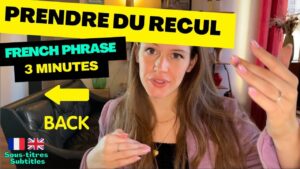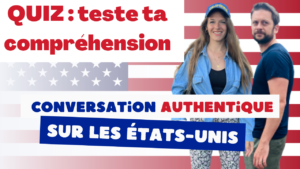In this video, I explain 12 expressions about money in French. There are a lot of expressions about money in French, and it can be interesting in your learning of French to know them. As a bonus, I've also added a few slang words on the theme of money.
You will find 11 other French slang words about money on this link.
Video Transcript
Bonjour tout le monde, I hope you're well and ready for a new video in French. Today, we're going to talk about money. Together we'll look at 12 expressions about money, the cost of things and wealth in French. At the end of the video, I'll also give you a little bonus with ten slang words for money. Before you start, make sure you activate the French subtitles. As I tell you in all my videos, this will help you to understand the video better and, above all, to better retain the new vocabulary words we're about to see. If you're new to the channel, don't forget to subscribe to receive all the videos. Let's start with the first expression: ça coûte un bras.
Un bras in French is just that. So when we say that something costs an arm, we mean that something is very expensive. Here are two examples to help you better understand this expression. - I'd love to buy some airpods, but they really cost an arm and a leg. - Really? How much do they cost? - They cost 150 euros a pair. - Ah yes, well. That's really, really expensive. Here's a second example. I dream of going to Japan, but the plane tickets cost an arm and a leg.
It's 1,000 euros round trip. It's really too expensive for me. It costs an arm and a leg. It's a colloquial expression. I'd rather use it with friends or family. There are two other very colloquial expressions that mean exactly the same thing as ça coûte un bras. Ça coûte bonbon. And, ça coûte les yeux de la tête. Both also mean that it's very expensive. The next expression is: c'est hors de prix. When we say that something is overpriced, we mean that it's very, very expensive.
It's the same as ça coûte un bras, except that "c'est hors de prix" is a more formal expression. You could also say it's overpriced for an object or service, something that costs more than the actual value of the thing or service. It's too expensive for what it is. Here are two examples. I'd love to buy the latest iPhone, but it's really overpriced. It's way too expensive for a phone.
Here's another example. I dream of going to the Maldives, but the plane tickets are really expensive. I can't afford them. Still in everyday language. There's another expression that means the same thing as "unaffordable": "ça coûte une fortune" ("it costs a fortune").
The next expression is pocket money. Pocket money in French is what you have in your pants or coat. L'argent de poche is an expression we use to refer to a small sum of money that is generally given to children or teenagers. Often, it's the parents who give this sum of money, but it can also be the grandparents, an uncle or an aunt. Children and teenagers can use this small sum of money to go to the cinema, to a restaurant, to buy clothes, etc. It's a sum of money to be used for leisure activities.
Here are two examples to help you understand pocket money. Every month, my parents give me 10 euros pocket money. With this money, I can go to the movies or to a restaurant with my friends. Here's a second example. I've been saving my pocket money for six months so that I can buy a new telephone.
Generally, parents or grandparents will give pocket money every week or month, but it can also be once in a while.
The next expression is "good accounts make good friends". It's an expression used in French to mean that you should always be careful to pay back the money you owe to your friends, or to pay for things in a fair, balanced way. To avoid losing your friends or losing the good relationship you have with them, you always have to make sure that everyone pays the same, so that you don't end up with a friend who might be aggrieved and a little angry with you if they pay more than you, for example. Here's an example to help you understand. In France, if you have a coffee with a friend, for example, and you pay for it, he may insist on paying you back. You might say "Ah, but it's only one euro! It doesn't matter", and he may reply "Yes, yes, I insist, I want to pay you back; good accounts make good friends". The next expression is "Did you win the lottery?
When you're surprised by someone's spending, the big expenses, the big purchases they're going to make, you can say to them: Did you win the lottery? It shows that you're really surprised by all his expensive spending, that you want to ask him how he gets all that money. We wonder if he won the lottery. Here are a few examples. - That's the third dress you've bought this month. - Did you win the lottery? Here's a second example in dialogue form. -I've just bought myself a new car.
- I don't? But you told me you didn't have any money saved up. Did you win the lottery? - Unfortunately, no. I had to take out a loan.
The next expression is "cheap". When we say something is cheap, it means it's really not expensive. You don't have to spend a lot of money. For example, I can say: I always buy bread at the bakery down the street. It's really cheap and really delicious.
A baguette costs just 90 centimes. Here's another example. - Do you know a cheap hotel in Paris? - Yes, I know one just around the corner. It's very nice and the rooms are really cheap.
Let's take a look at the expression "c'est donné". When we say that something is given, we don't mean that it's free, that it was a gift. We just mean that it's so cheap, so inexpensive, that we consider it a gift.
For example, I can say: cinema tickets are 2 euros instead of 7 euros at the moment, which is a real bargain. You have to go right away. Here's another example. There's a sale on at my favorite boutique right now. Everything is minus 70 %. Clothes are going to be practically given away. We also say that something isn't cheap. When we say that something isn't cheap, it means that it's a little more expensive than we thought.
It's not overpriced, it doesn't cost a fortune, but it does cost a bit of money. Here's an example. Tickets for the Shakira concert, at 80 euros, are not cheap. I have to think about whether I really want to spend all that money on a concert ticket. The next expression is "throwing money away". When we say that someone is throwing money out the window, we mean that he's a real spendthrift, that he spends a lot of money and wastes money as if he were throwing it out the window.
Here's an example. You bought yourself a new phone again? This is the third one this year. The others worked fine. You should be careful with your money, you're really throwing it away.
The next expression is to be armored. He's armored or she's armored, or I'm armored. It's a slang expression, in very colloquial language, to say that someone is rich, blindé meaning rich. Here are two examples to help you understand.
Jeff Bezos is loaded, that's a fact. He owns more than $200 billion.
Shall we go to a little restaurant tonight? We already went yesterday, this is starting to add up. Oh come on, we're loaded, we can afford it. We have enough money.
The next expression is: to be up to your neck in debt. The neck in French is that part of the body. To be up to your neck in debt means that you're in debt, that you owe money.
We add up to the neck because we want to emphasize the seriousness of the situation, we're really in a very difficult situation. We add up to the neck because it's as if we're choking on debt. Here are two examples. - Your apartment is really beautiful and really big. - Thank you very much, but I had to go up to my neck in debt to buy it. The second example of being up to my neck in debt I saw in the press this week, and I'll give you an extract from this article.
This old man, having been swindled, is up to his neck in debt, and has even had to sell his house to pay off his debts. It's not a very happy expression, it's quite sad. The next expression is "to be broke". If I say I'm broke this month, it means I've run out of money, I've got zero euros in my account. Here are two examples. - How about a movie tonight? - I can't make it. I'm broke. I've already spent all the pocket money my parents gave me for this month.
- It's barely the 12th of the month and I'm already broke. - Have you been shopping too much again? - Yes, I have.
Another expression for being broke is being broke. If I'm broke, it means I'm broke, I've run out of money.
The last expression we're going to look at today is "faire les comptes" or "faire ses comptes". When you do your accounts, you can see and calculate where you stand financially. Either to prepare for the month ahead, to see what expenses you're going to have and how much money you're going to need for those expenses, or to take stock of the past month.
To check that you haven't spent too much, that your accounts are balanced. Here are two examples. I've just done the accounts, we spent almost nothing last month, we have plenty of money left in our bank account. Here's a second example. I'd really like to buy a new TV, but first I have to do my accounts to see if I have enough money to buy it, to check if I can really afford it.
You could also say that there's more than one person doing the accounts. Let me explain. For example, if we go on holiday with friends and I've paid for the train tickets. My friend Antoine paid for all the restaurant bills and my friend Noémie paid for the hotel. At the end of the vacation, we'll do the sums, we'll calculate, we'll check that everyone paid the same thing.
Once we've done the sums, we can say, for example, Elisabeth, you owe Noémie 50 euros so that everyone has paid the same and we're in balance. Now for the little bonuses. We're going to look at 10 slang words that are synonyms for money. They all mean money. There are more words. I'll give you the most common ones. If you know of any others, post them as comments. It'll add to the community's vocabulary.
I'm going to tell you each time the synonym for money in French, with a little context so you understand. De la thune. I'm out of money this month, sorry, I can't go to the movies. De la maille. Did you take the knitting to the shops? Money. Oh no, I forgot my wallet. It had all my money in it. Dough. I earn enough dough to go on vacation twice a year.
I have a good salary. Money. I'm broke this month, my bank account shows 0 euros. Cash. I made a lot of money this month on the Vinted app, I sold a lot of clothes. Sorrel. I spent all my dough on this new car and now I've got nothing. Biff. I'm working just to earn a bit of cash, because I'm not too interested in my job or my day-to-day tasks. Money. With all the money you've won in the lottery, you'll be able to buy a villa by the sea. And finally, the last slang synonym for money is moula.
It's a very fashionable word these days among young people, especially rappers. You could say that rappers want to make money. They often want to make a lot of money. That's it for today. I hope you enjoyed this video and learned something new. If you did, remember to put a like on it and, above all, if you're new, remember to subscribe to the channel to receive all the videos. See you soon.








